Real Estate Industry Report: CPPREP4001, RTO 32426, Real Estate Study
VerifiedAdded on 2022/09/13
|17
|3295
|32
Report
AI Summary
This report provides a comprehensive overview of the real estate industry, addressing various aspects such as business ownership options (sole traders, partnerships, companies, and trusts), services offered by real estate agencies (sales and property management), and organizational structures (independent and franchise). It delves into agency staff roles and responsibilities, including agents, administration, and management, and elucidates the agency-principal relationship. The report identifies parties involved in real estate transactions, explores agency obligations regarding commission sharing, and discusses the repercussions of unlicensed real estate activities. Key agencies and industry bodies, including Consumer Affairs, Civil and Administrative Tribunal, and the Real Estate Institute of Australia (REIA), are examined. The report also outlines legislative requirements governing the industry, including licensing, eligibility, and equal opportunity principles. It highlights ethical and professional conduct standards, including relevant legislation and obligations of licensees, emphasizing the importance of ethical behavior and compliance with regulations in day-to-day dealings with clients and consumers.
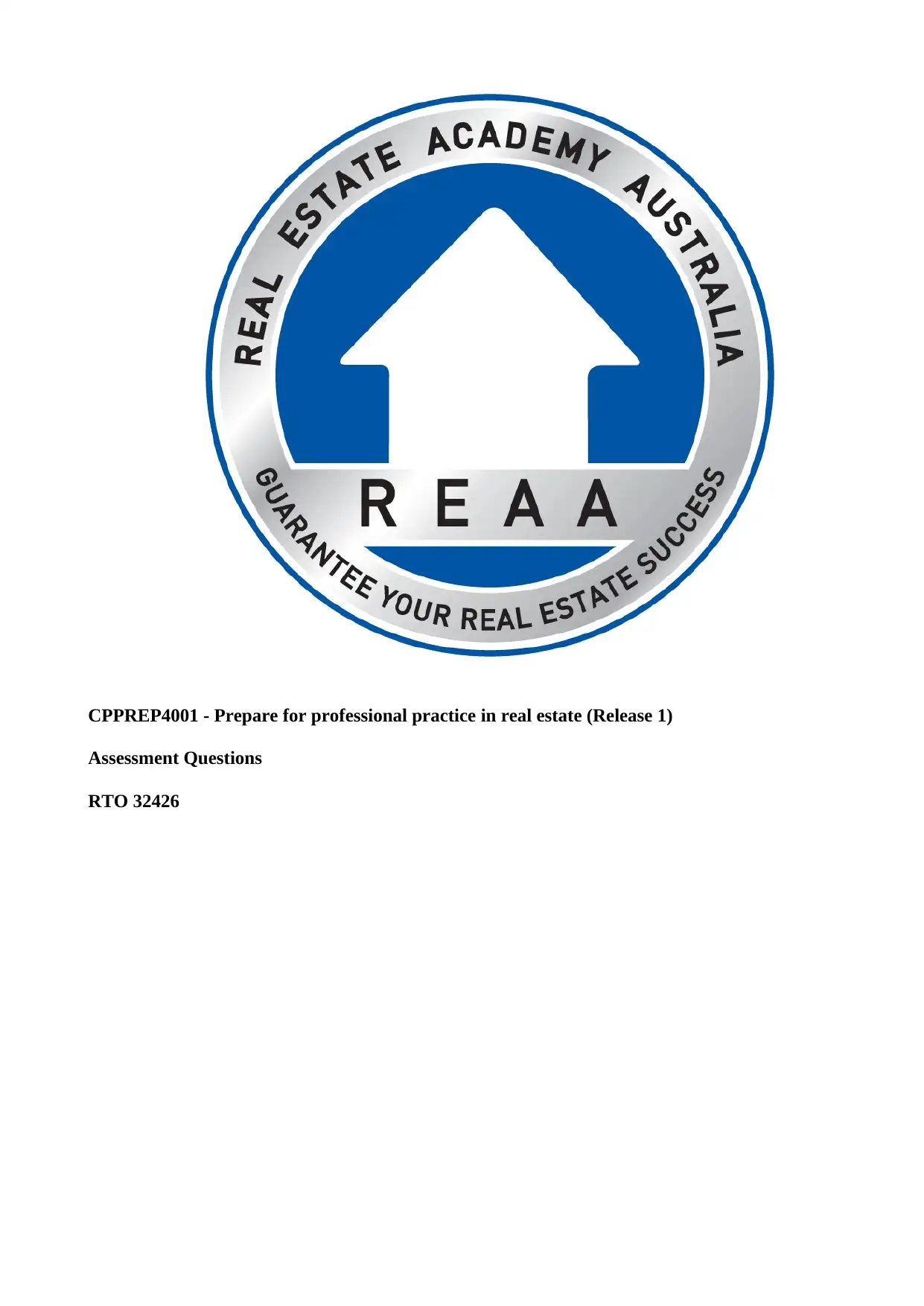
CPPREP4001 - Prepare for professional practice in real estate (Release 1)
Assessment Questions
RTO 32426
Assessment Questions
RTO 32426
Paraphrase This Document
Need a fresh take? Get an instant paraphrase of this document with our AI Paraphraser
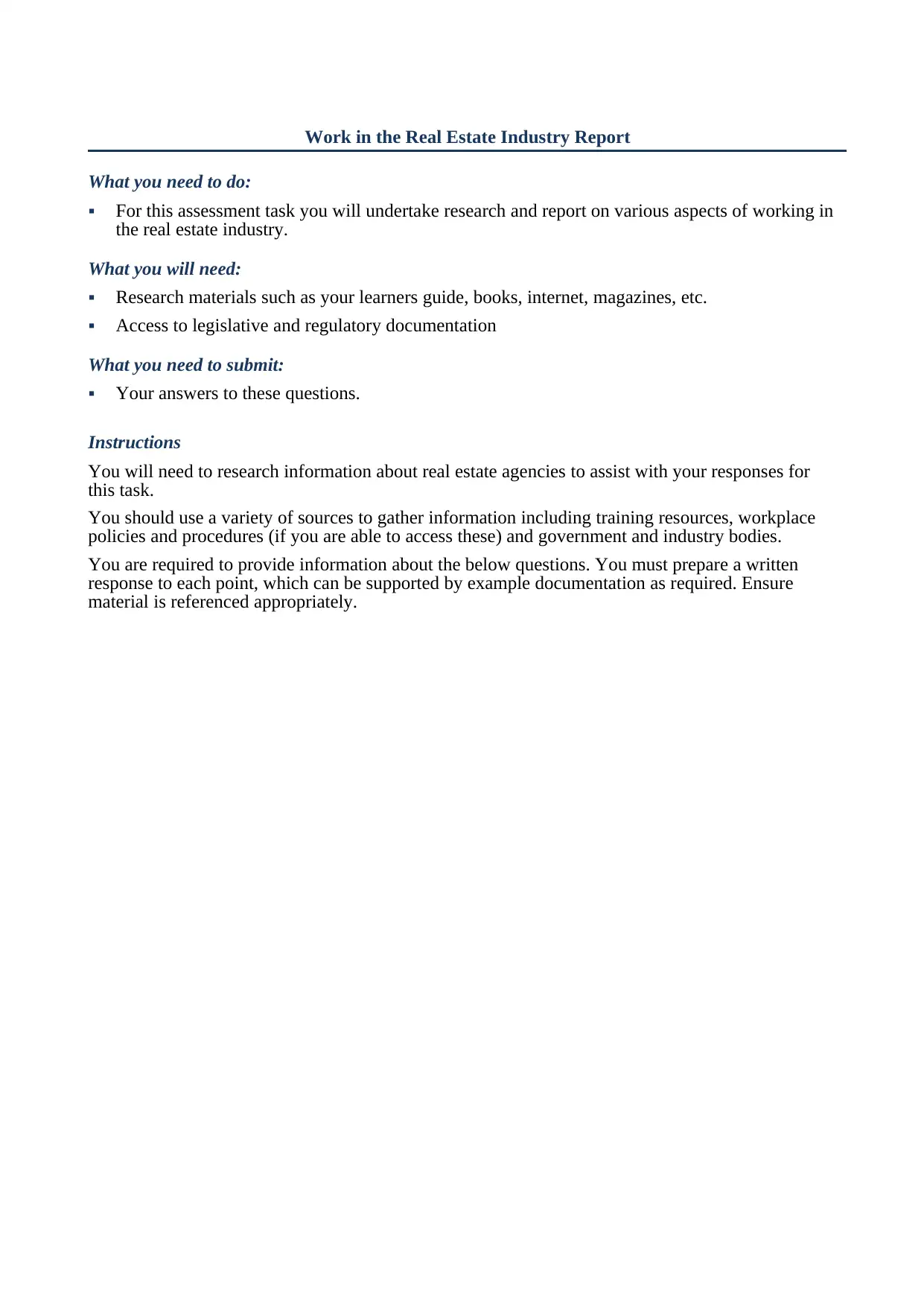
Work in the Real Estate Industry Report
What you need to do:
For this assessment task you will undertake research and report on various aspects of working in
the real estate industry.
What you will need:
Research materials such as your learners guide, books, internet, magazines, etc.
Access to legislative and regulatory documentation
What you need to submit:
Your answers to these questions.
Instructions
You will need to research information about real estate agencies to assist with your responses for
this task.
You should use a variety of sources to gather information including training resources, workplace
policies and procedures (if you are able to access these) and government and industry bodies.
You are required to provide information about the below questions. You must prepare a written
response to each point, which can be supported by example documentation as required. Ensure
material is referenced appropriately.
What you need to do:
For this assessment task you will undertake research and report on various aspects of working in
the real estate industry.
What you will need:
Research materials such as your learners guide, books, internet, magazines, etc.
Access to legislative and regulatory documentation
What you need to submit:
Your answers to these questions.
Instructions
You will need to research information about real estate agencies to assist with your responses for
this task.
You should use a variety of sources to gather information including training resources, workplace
policies and procedures (if you are able to access these) and government and industry bodies.
You are required to provide information about the below questions. You must prepare a written
response to each point, which can be supported by example documentation as required. Ensure
material is referenced appropriately.
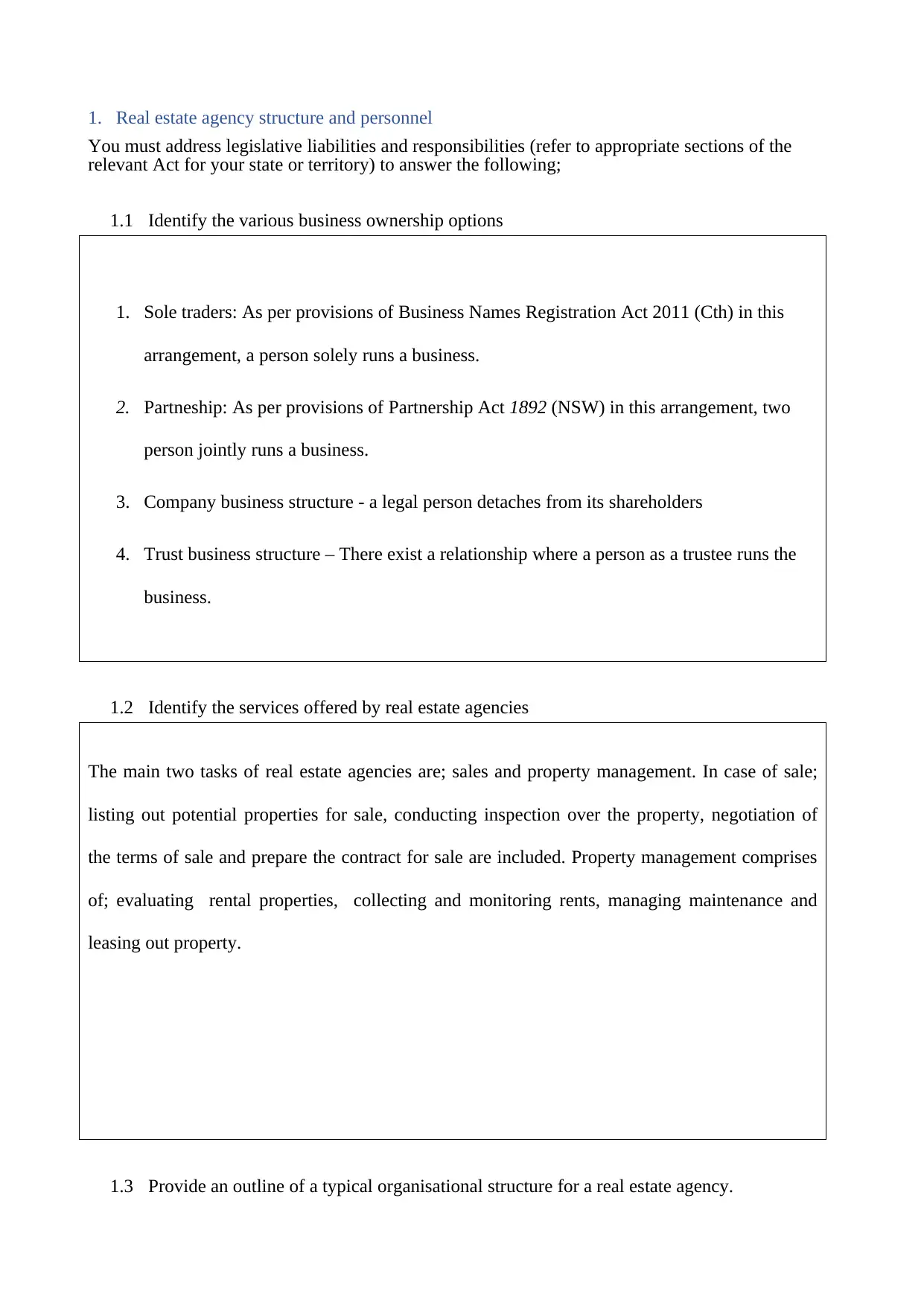
1. Real estate agency structure and personnel
You must address legislative liabilities and responsibilities (refer to appropriate sections of the
relevant Act for your state or territory) to answer the following;
1.1 Identify the various business ownership options
1. Sole traders: As per provisions of Business Names Registration Act 2011 (Cth) in this
arrangement, a person solely runs a business.
2. Partneship: As per provisions of Partnership Act 1892 (NSW) in this arrangement, two
person jointly runs a business.
3. Company business structure - a legal person detaches from its shareholders
4. Trust business structure – There exist a relationship where a person as a trustee runs the
business.
1.2 Identify the services offered by real estate agencies
The main two tasks of real estate agencies are; sales and property management. In case of sale;
listing out potential properties for sale, conducting inspection over the property, negotiation of
the terms of sale and prepare the contract for sale are included. Property management comprises
of; evaluating rental properties, collecting and monitoring rents, managing maintenance and
leasing out property.
1.3 Provide an outline of a typical organisational structure for a real estate agency.
You must address legislative liabilities and responsibilities (refer to appropriate sections of the
relevant Act for your state or territory) to answer the following;
1.1 Identify the various business ownership options
1. Sole traders: As per provisions of Business Names Registration Act 2011 (Cth) in this
arrangement, a person solely runs a business.
2. Partneship: As per provisions of Partnership Act 1892 (NSW) in this arrangement, two
person jointly runs a business.
3. Company business structure - a legal person detaches from its shareholders
4. Trust business structure – There exist a relationship where a person as a trustee runs the
business.
1.2 Identify the services offered by real estate agencies
The main two tasks of real estate agencies are; sales and property management. In case of sale;
listing out potential properties for sale, conducting inspection over the property, negotiation of
the terms of sale and prepare the contract for sale are included. Property management comprises
of; evaluating rental properties, collecting and monitoring rents, managing maintenance and
leasing out property.
1.3 Provide an outline of a typical organisational structure for a real estate agency.
⊘ This is a preview!⊘
Do you want full access?
Subscribe today to unlock all pages.

Trusted by 1+ million students worldwide
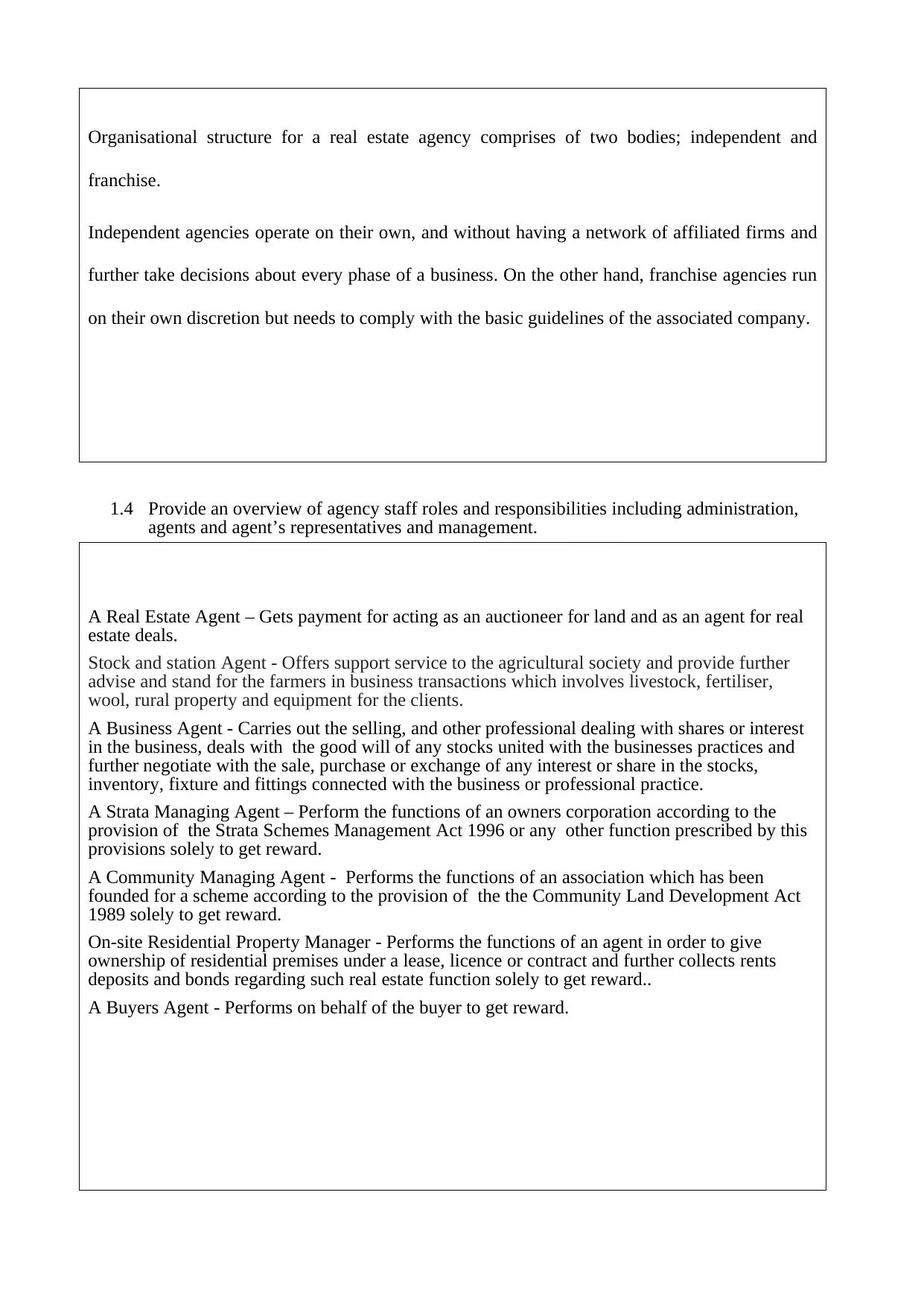
Organisational structure for a real estate agency comprises of two bodies; independent and
franchise.
Independent agencies operate on their own, and without having a network of affiliated firms and
further take decisions about every phase of a business. On the other hand, franchise agencies run
on their own discretion but needs to comply with the basic guidelines of the associated company.
1.4 Provide an overview of agency staff roles and responsibilities including administration,
agents and agent’s representatives and management.
A Real Estate Agent – Gets payment for acting as an auctioneer for land and as an agent for real
estate deals.
Stock and station Agent - Offers support service to the agricultural society and provide further
advise and stand for the farmers in business transactions which involves livestock, fertiliser,
wool, rural property and equipment for the clients.
A Business Agent - Carries out the selling, and other professional dealing with shares or interest
in the business, deals with the good will of any stocks united with the businesses practices and
further negotiate with the sale, purchase or exchange of any interest or share in the stocks,
inventory, fixture and fittings connected with the business or professional practice.
A Strata Managing Agent – Perform the functions of an owners corporation according to the
provision of the Strata Schemes Management Act 1996 or any other function prescribed by this
provisions solely to get reward.
A Community Managing Agent - Performs the functions of an association which has been
founded for a scheme according to the provision of the the Community Land Development Act
1989 solely to get reward.
On-site Residential Property Manager - Performs the functions of an agent in order to give
ownership of residential premises under a lease, licence or contract and further collects rents
deposits and bonds regarding such real estate function solely to get reward..
A Buyers Agent - Performs on behalf of the buyer to get reward.
franchise.
Independent agencies operate on their own, and without having a network of affiliated firms and
further take decisions about every phase of a business. On the other hand, franchise agencies run
on their own discretion but needs to comply with the basic guidelines of the associated company.
1.4 Provide an overview of agency staff roles and responsibilities including administration,
agents and agent’s representatives and management.
A Real Estate Agent – Gets payment for acting as an auctioneer for land and as an agent for real
estate deals.
Stock and station Agent - Offers support service to the agricultural society and provide further
advise and stand for the farmers in business transactions which involves livestock, fertiliser,
wool, rural property and equipment for the clients.
A Business Agent - Carries out the selling, and other professional dealing with shares or interest
in the business, deals with the good will of any stocks united with the businesses practices and
further negotiate with the sale, purchase or exchange of any interest or share in the stocks,
inventory, fixture and fittings connected with the business or professional practice.
A Strata Managing Agent – Perform the functions of an owners corporation according to the
provision of the Strata Schemes Management Act 1996 or any other function prescribed by this
provisions solely to get reward.
A Community Managing Agent - Performs the functions of an association which has been
founded for a scheme according to the provision of the the Community Land Development Act
1989 solely to get reward.
On-site Residential Property Manager - Performs the functions of an agent in order to give
ownership of residential premises under a lease, licence or contract and further collects rents
deposits and bonds regarding such real estate function solely to get reward..
A Buyers Agent - Performs on behalf of the buyer to get reward.
Paraphrase This Document
Need a fresh take? Get an instant paraphrase of this document with our AI Paraphraser
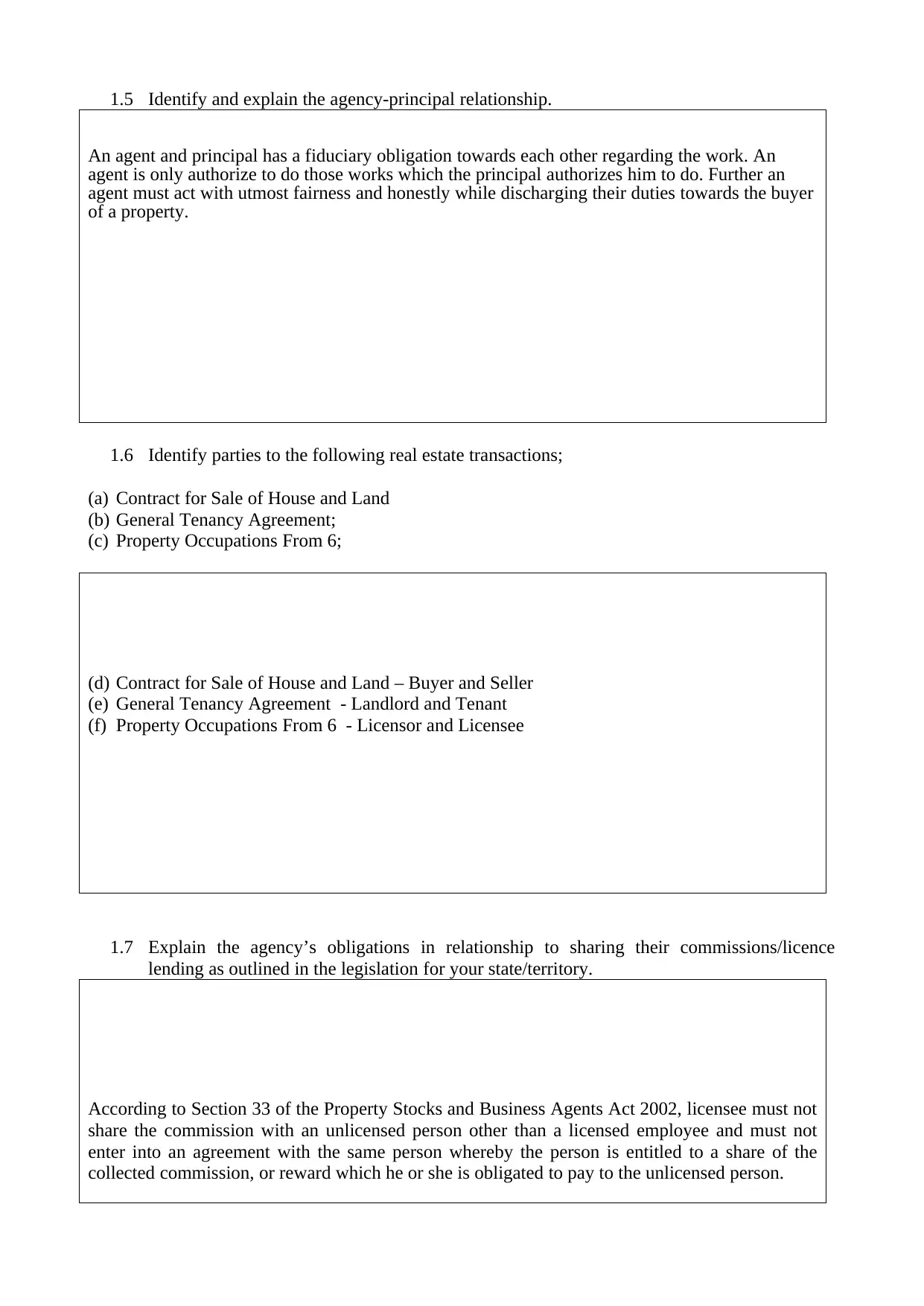
1.5 Identify and explain the agency-principal relationship.
An agent and principal has a fiduciary obligation towards each other regarding the work. An
agent is only authorize to do those works which the principal authorizes him to do. Further an
agent must act with utmost fairness and honestly while discharging their duties towards the buyer
of a property.
1.6 Identify parties to the following real estate transactions;
(a) Contract for Sale of House and Land
(b) General Tenancy Agreement;
(c) Property Occupations From 6;
(d) Contract for Sale of House and Land – Buyer and Seller
(e) General Tenancy Agreement - Landlord and Tenant
(f) Property Occupations From 6 - Licensor and Licensee
1.7 Explain the agency’s obligations in relationship to sharing their commissions/licence
lending as outlined in the legislation for your state/territory.
According to Section 33 of the Property Stocks and Business Agents Act 2002, licensee must not
share the commission with an unlicensed person other than a licensed employee and must not
enter into an agreement with the same person whereby the person is entitled to a share of the
collected commission, or reward which he or she is obligated to pay to the unlicensed person.
An agent and principal has a fiduciary obligation towards each other regarding the work. An
agent is only authorize to do those works which the principal authorizes him to do. Further an
agent must act with utmost fairness and honestly while discharging their duties towards the buyer
of a property.
1.6 Identify parties to the following real estate transactions;
(a) Contract for Sale of House and Land
(b) General Tenancy Agreement;
(c) Property Occupations From 6;
(d) Contract for Sale of House and Land – Buyer and Seller
(e) General Tenancy Agreement - Landlord and Tenant
(f) Property Occupations From 6 - Licensor and Licensee
1.7 Explain the agency’s obligations in relationship to sharing their commissions/licence
lending as outlined in the legislation for your state/territory.
According to Section 33 of the Property Stocks and Business Agents Act 2002, licensee must not
share the commission with an unlicensed person other than a licensed employee and must not
enter into an agreement with the same person whereby the person is entitled to a share of the
collected commission, or reward which he or she is obligated to pay to the unlicensed person.
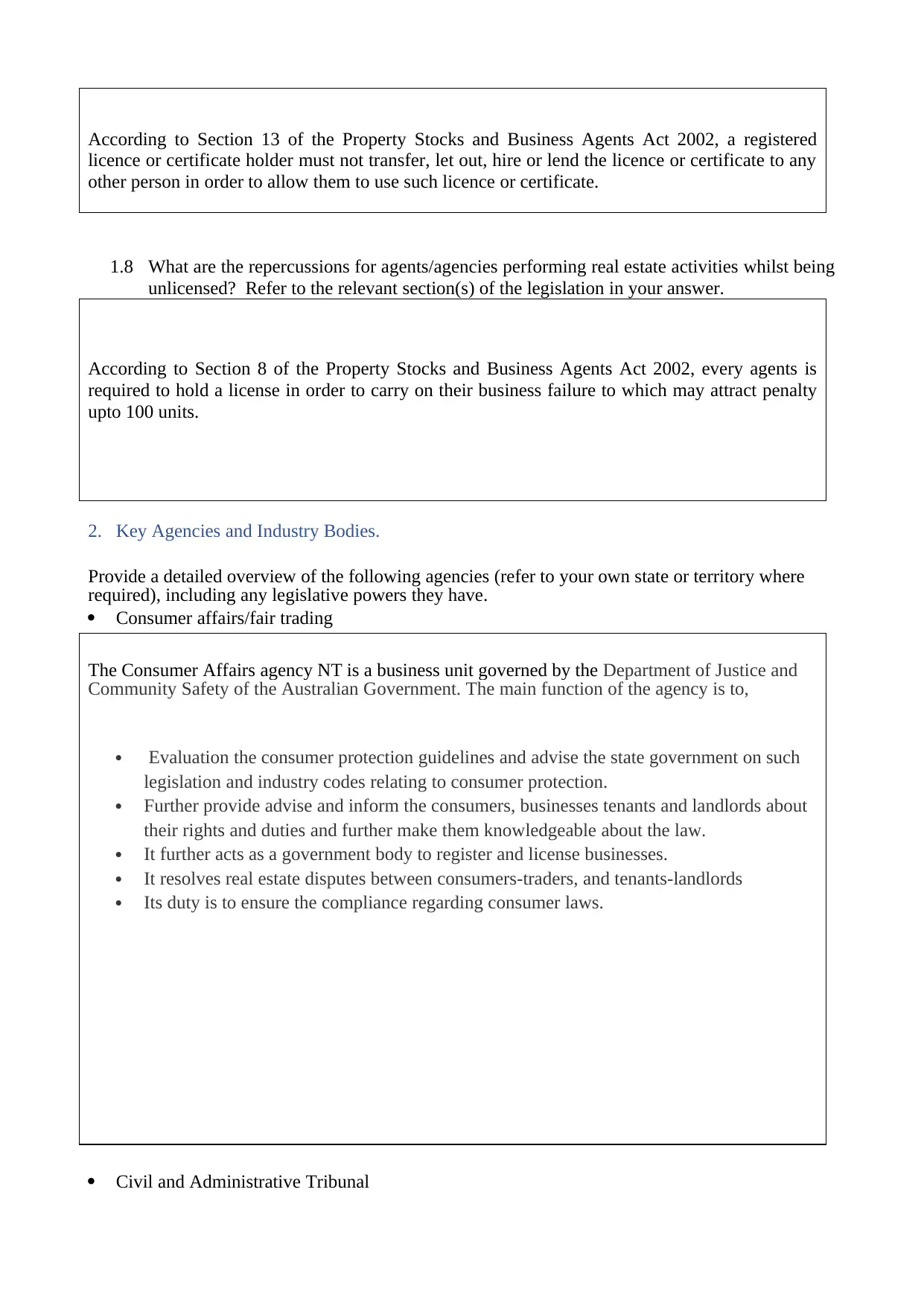
According to Section 13 of the Property Stocks and Business Agents Act 2002, a registered
licence or certificate holder must not transfer, let out, hire or lend the licence or certificate to any
other person in order to allow them to use such licence or certificate.
1.8 What are the repercussions for agents/agencies performing real estate activities whilst being
unlicensed? Refer to the relevant section(s) of the legislation in your answer.
According to Section 8 of the Property Stocks and Business Agents Act 2002, every agents is
required to hold a license in order to carry on their business failure to which may attract penalty
upto 100 units.
2. Key Agencies and Industry Bodies.
Provide a detailed overview of the following agencies (refer to your own state or territory where
required), including any legislative powers they have.
Consumer affairs/fair trading
The Consumer Affairs agency NT is a business unit governed by the Department of Justice and
Community Safety of the Australian Government. The main function of the agency is to,
Evaluation the consumer protection guidelines and advise the state government on such
legislation and industry codes relating to consumer protection.
Further provide advise and inform the consumers, businesses tenants and landlords about
their rights and duties and further make them knowledgeable about the law.
It further acts as a government body to register and license businesses.
It resolves real estate disputes between consumers-traders, and tenants-landlords
Its duty is to ensure the compliance regarding consumer laws.
Civil and Administrative Tribunal
licence or certificate holder must not transfer, let out, hire or lend the licence or certificate to any
other person in order to allow them to use such licence or certificate.
1.8 What are the repercussions for agents/agencies performing real estate activities whilst being
unlicensed? Refer to the relevant section(s) of the legislation in your answer.
According to Section 8 of the Property Stocks and Business Agents Act 2002, every agents is
required to hold a license in order to carry on their business failure to which may attract penalty
upto 100 units.
2. Key Agencies and Industry Bodies.
Provide a detailed overview of the following agencies (refer to your own state or territory where
required), including any legislative powers they have.
Consumer affairs/fair trading
The Consumer Affairs agency NT is a business unit governed by the Department of Justice and
Community Safety of the Australian Government. The main function of the agency is to,
Evaluation the consumer protection guidelines and advise the state government on such
legislation and industry codes relating to consumer protection.
Further provide advise and inform the consumers, businesses tenants and landlords about
their rights and duties and further make them knowledgeable about the law.
It further acts as a government body to register and license businesses.
It resolves real estate disputes between consumers-traders, and tenants-landlords
Its duty is to ensure the compliance regarding consumer laws.
Civil and Administrative Tribunal
⊘ This is a preview!⊘
Do you want full access?
Subscribe today to unlock all pages.

Trusted by 1+ million students worldwide
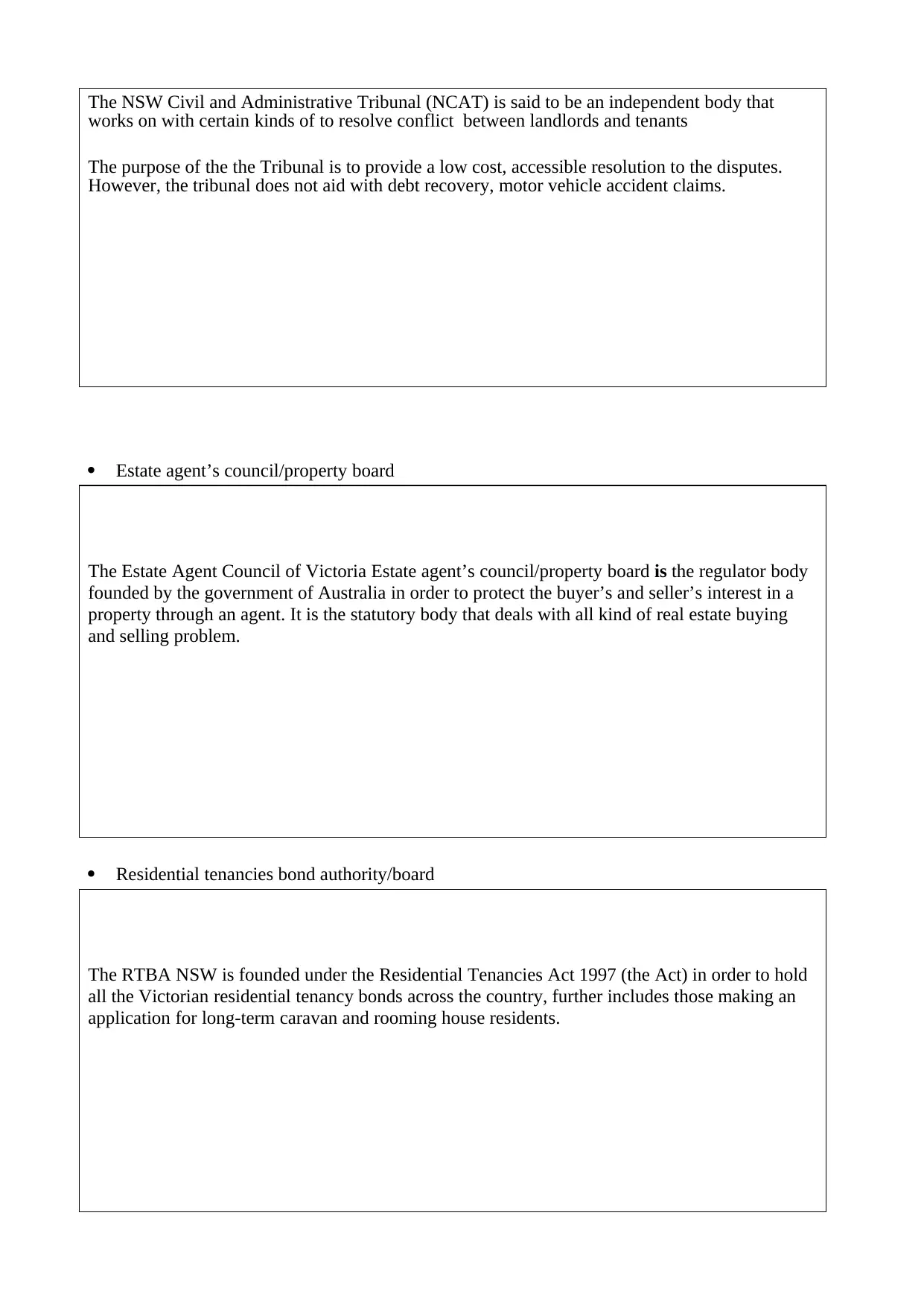
The NSW Civil and Administrative Tribunal (NCAT) is said to be an independent body that
works on with certain kinds of to resolve conflict between landlords and tenants
The purpose of the the Tribunal is to provide a low cost, accessible resolution to the disputes.
However, the tribunal does not aid with debt recovery, motor vehicle accident claims.
Estate agent’s council/property board
The Estate Agent Council of Victoria Estate agent’s council/property board is the regulator body
founded by the government of Australia in order to protect the buyer’s and seller’s interest in a
property through an agent. It is the statutory body that deals with all kind of real estate buying
and selling problem.
Residential tenancies bond authority/board
The RTBA NSW is founded under the Residential Tenancies Act 1997 (the Act) in order to hold
all the Victorian residential tenancy bonds across the country, further includes those making an
application for long-term caravan and rooming house residents.
works on with certain kinds of to resolve conflict between landlords and tenants
The purpose of the the Tribunal is to provide a low cost, accessible resolution to the disputes.
However, the tribunal does not aid with debt recovery, motor vehicle accident claims.
Estate agent’s council/property board
The Estate Agent Council of Victoria Estate agent’s council/property board is the regulator body
founded by the government of Australia in order to protect the buyer’s and seller’s interest in a
property through an agent. It is the statutory body that deals with all kind of real estate buying
and selling problem.
Residential tenancies bond authority/board
The RTBA NSW is founded under the Residential Tenancies Act 1997 (the Act) in order to hold
all the Victorian residential tenancy bonds across the country, further includes those making an
application for long-term caravan and rooming house residents.
Paraphrase This Document
Need a fresh take? Get an instant paraphrase of this document with our AI Paraphraser
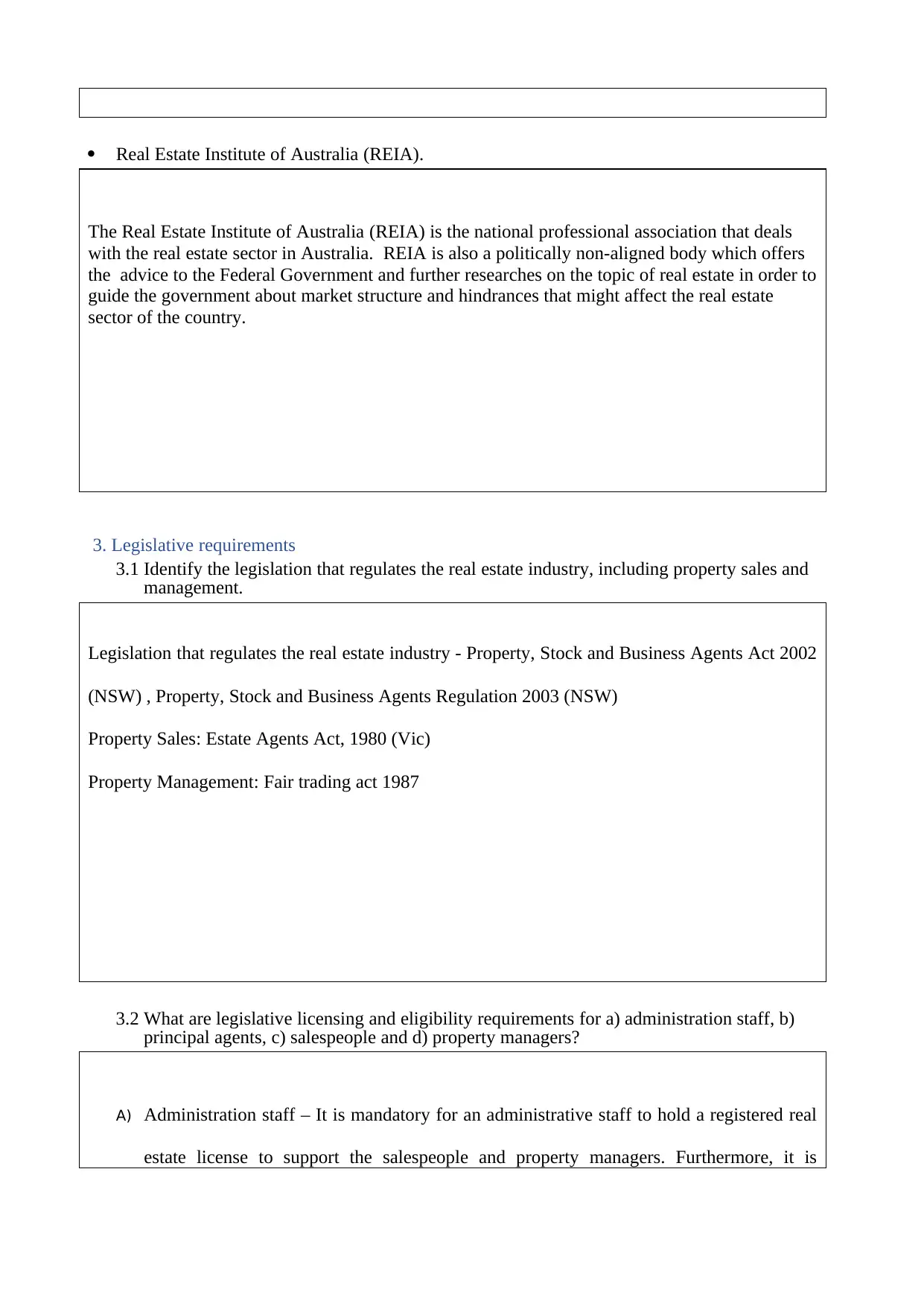
Real Estate Institute of Australia (REIA).
The Real Estate Institute of Australia (REIA) is the national professional association that deals
with the real estate sector in Australia. REIA is also a politically non-aligned body which offers
the advice to the Federal Government and further researches on the topic of real estate in order to
guide the government about market structure and hindrances that might affect the real estate
sector of the country.
3. Legislative requirements
3.1 Identify the legislation that regulates the real estate industry, including property sales and
management.
Legislation that regulates the real estate industry - Property, Stock and Business Agents Act 2002
(NSW) , Property, Stock and Business Agents Regulation 2003 (NSW)
Property Sales: Estate Agents Act, 1980 (Vic)
Property Management: Fair trading act 1987
3.2 What are legislative licensing and eligibility requirements for a) administration staff, b)
principal agents, c) salespeople and d) property managers?
A) Administration staff – It is mandatory for an administrative staff to hold a registered real
estate license to support the salespeople and property managers. Furthermore, it is
The Real Estate Institute of Australia (REIA) is the national professional association that deals
with the real estate sector in Australia. REIA is also a politically non-aligned body which offers
the advice to the Federal Government and further researches on the topic of real estate in order to
guide the government about market structure and hindrances that might affect the real estate
sector of the country.
3. Legislative requirements
3.1 Identify the legislation that regulates the real estate industry, including property sales and
management.
Legislation that regulates the real estate industry - Property, Stock and Business Agents Act 2002
(NSW) , Property, Stock and Business Agents Regulation 2003 (NSW)
Property Sales: Estate Agents Act, 1980 (Vic)
Property Management: Fair trading act 1987
3.2 What are legislative licensing and eligibility requirements for a) administration staff, b)
principal agents, c) salespeople and d) property managers?
A) Administration staff – It is mandatory for an administrative staff to hold a registered real
estate license to support the salespeople and property managers. Furthermore, it is
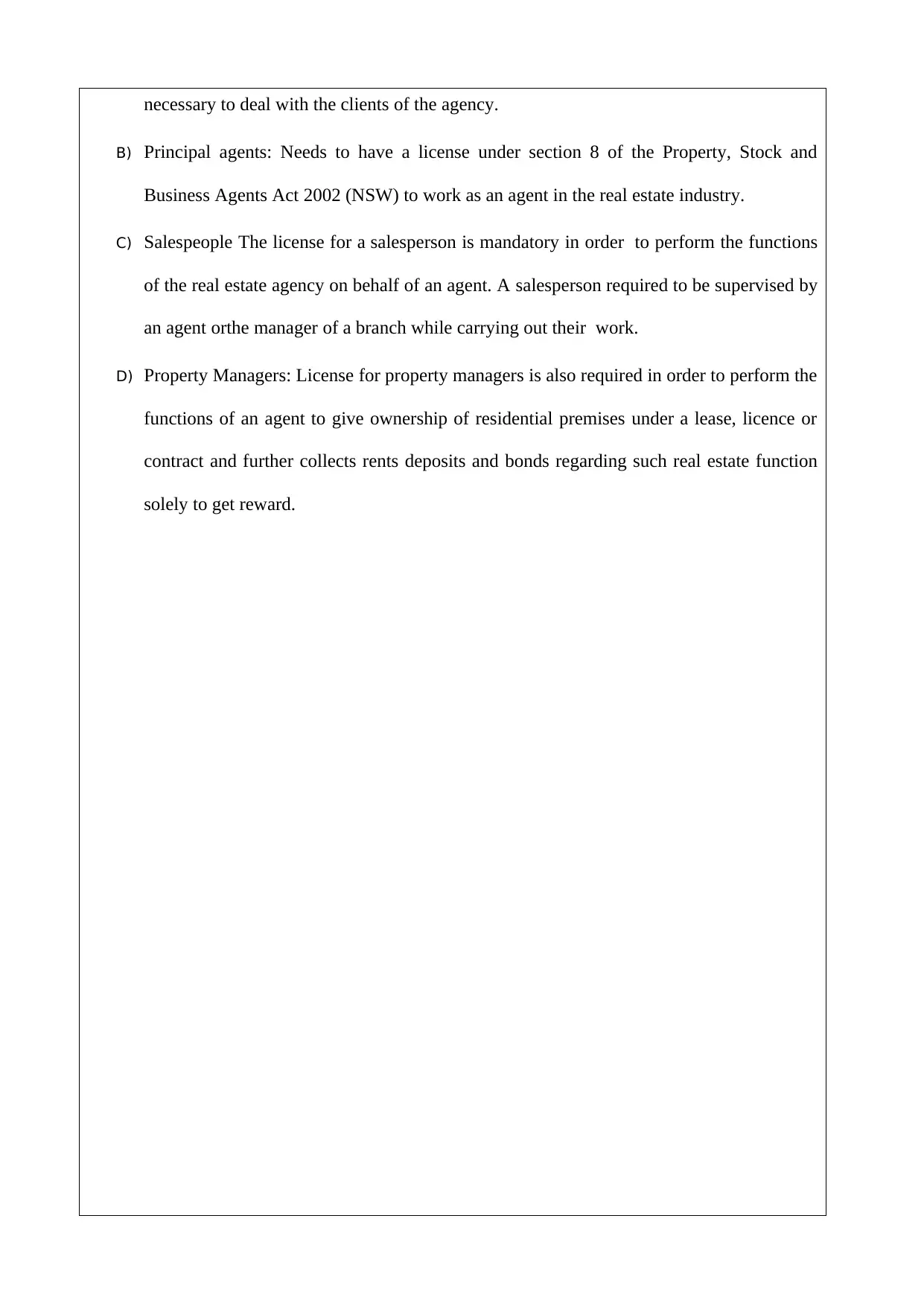
necessary to deal with the clients of the agency.
B) Principal agents: Needs to have a license under section 8 of the Property, Stock and
Business Agents Act 2002 (NSW) to work as an agent in the real estate industry.
C) Salespeople The license for a salesperson is mandatory in order to perform the functions
of the real estate agency on behalf of an agent. A salesperson required to be supervised by
an agent orthe manager of a branch while carrying out their work.
D) Property Managers: License for property managers is also required in order to perform the
functions of an agent to give ownership of residential premises under a lease, licence or
contract and further collects rents deposits and bonds regarding such real estate function
solely to get reward.
B) Principal agents: Needs to have a license under section 8 of the Property, Stock and
Business Agents Act 2002 (NSW) to work as an agent in the real estate industry.
C) Salespeople The license for a salesperson is mandatory in order to perform the functions
of the real estate agency on behalf of an agent. A salesperson required to be supervised by
an agent orthe manager of a branch while carrying out their work.
D) Property Managers: License for property managers is also required in order to perform the
functions of an agent to give ownership of residential premises under a lease, licence or
contract and further collects rents deposits and bonds regarding such real estate function
solely to get reward.
⊘ This is a preview!⊘
Do you want full access?
Subscribe today to unlock all pages.

Trusted by 1+ million students worldwide
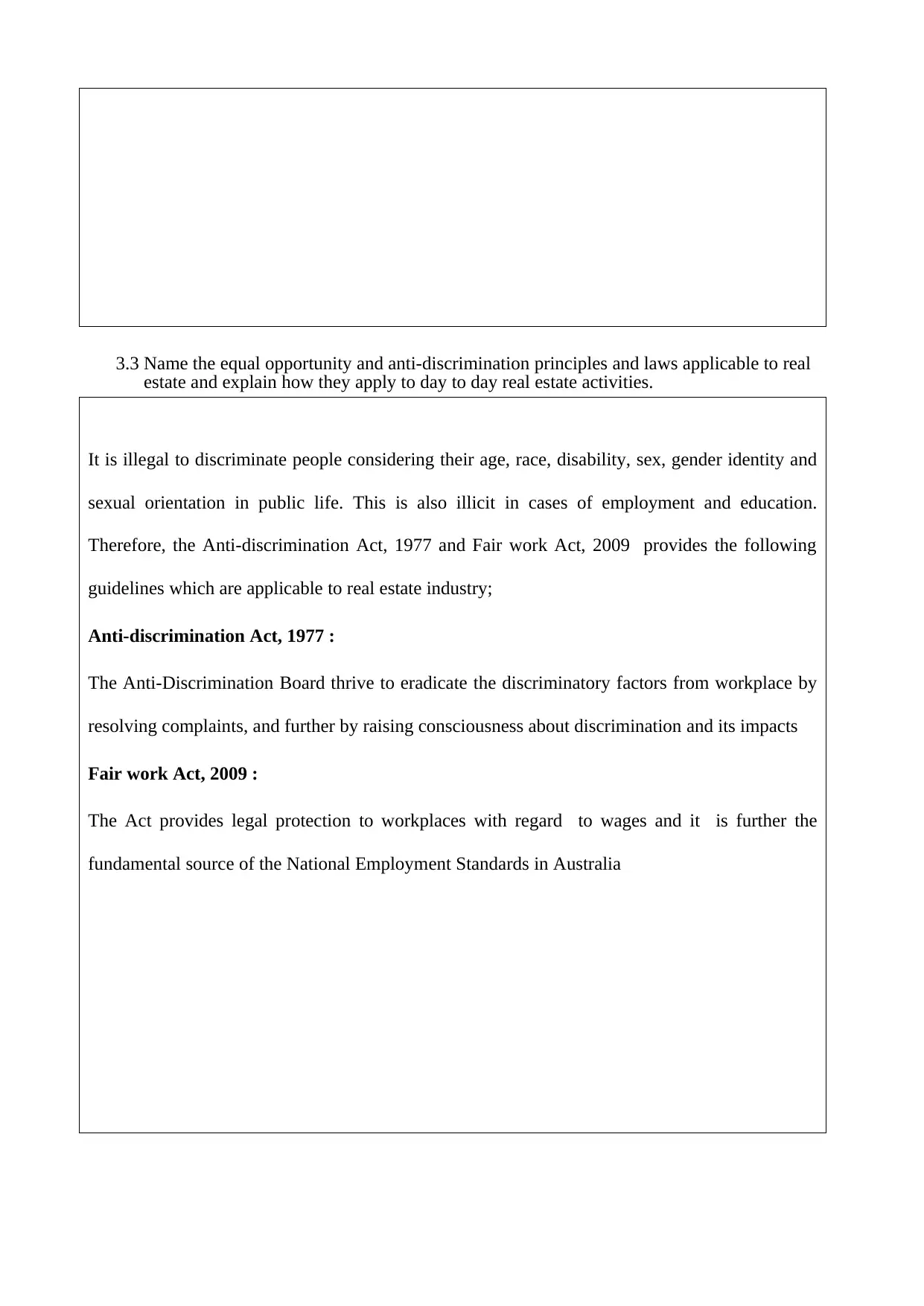
3.3 Name the equal opportunity and anti-discrimination principles and laws applicable to real
estate and explain how they apply to day to day real estate activities.
It is illegal to discriminate people considering their age, race, disability, sex, gender identity and
sexual orientation in public life. This is also illicit in cases of employment and education.
Therefore, the Anti-discrimination Act, 1977 and Fair work Act, 2009 provides the following
guidelines which are applicable to real estate industry;
Anti-discrimination Act, 1977 :
The Anti-Discrimination Board thrive to eradicate the discriminatory factors from workplace by
resolving complaints, and further by raising consciousness about discrimination and its impacts
Fair work Act, 2009 :
The Act provides legal protection to workplaces with regard to wages and it is further the
fundamental source of the National Employment Standards in Australia
estate and explain how they apply to day to day real estate activities.
It is illegal to discriminate people considering their age, race, disability, sex, gender identity and
sexual orientation in public life. This is also illicit in cases of employment and education.
Therefore, the Anti-discrimination Act, 1977 and Fair work Act, 2009 provides the following
guidelines which are applicable to real estate industry;
Anti-discrimination Act, 1977 :
The Anti-Discrimination Board thrive to eradicate the discriminatory factors from workplace by
resolving complaints, and further by raising consciousness about discrimination and its impacts
Fair work Act, 2009 :
The Act provides legal protection to workplaces with regard to wages and it is further the
fundamental source of the National Employment Standards in Australia
Paraphrase This Document
Need a fresh take? Get an instant paraphrase of this document with our AI Paraphraser
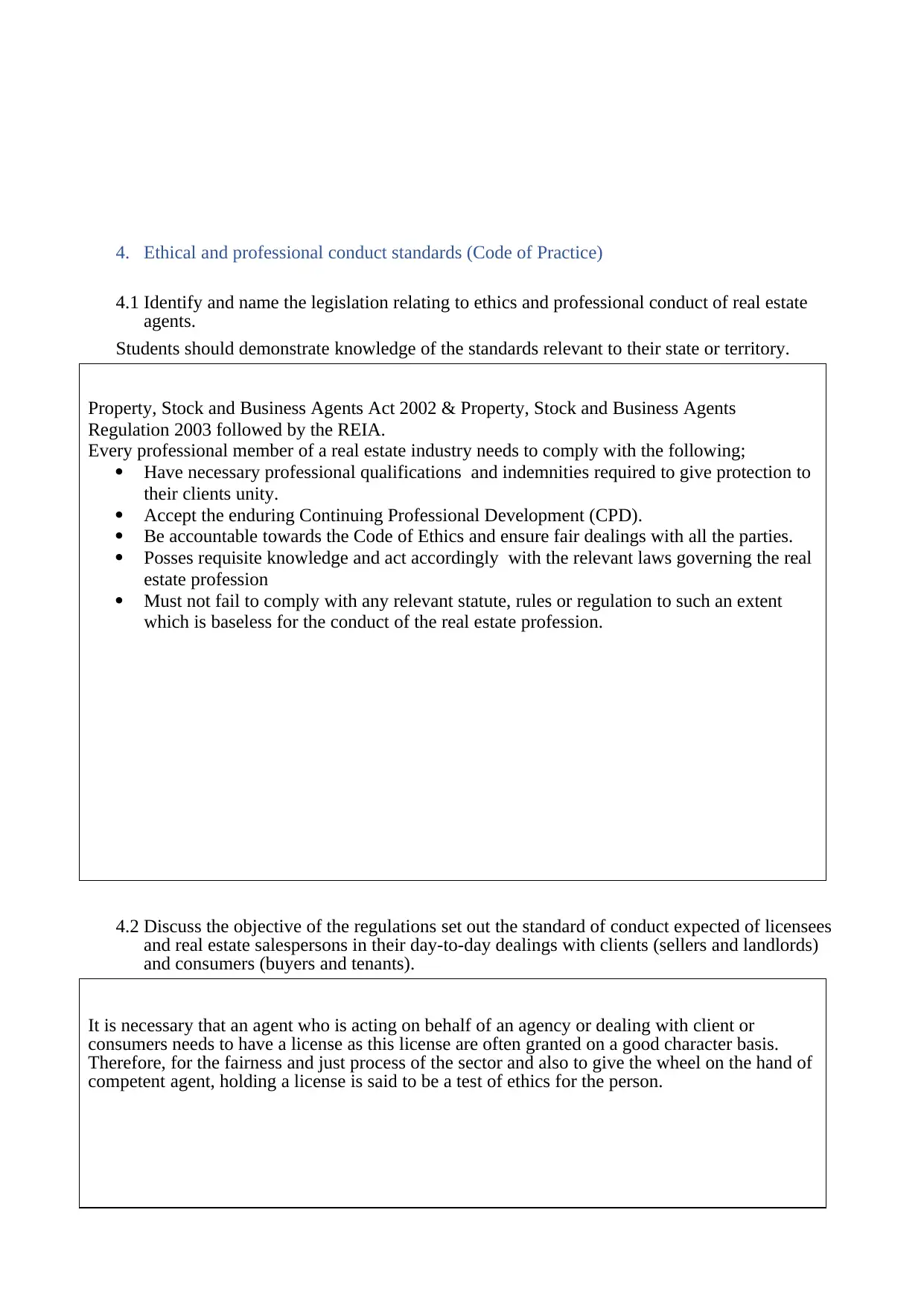
4. Ethical and professional conduct standards (Code of Practice)
4.1 Identify and name the legislation relating to ethics and professional conduct of real estate
agents.
Students should demonstrate knowledge of the standards relevant to their state or territory.
Property, Stock and Business Agents Act 2002 & Property, Stock and Business Agents
Regulation 2003 followed by the REIA.
Every professional member of a real estate industry needs to comply with the following;
Have necessary professional qualifications and indemnities required to give protection to
their clients unity.
Accept the enduring Continuing Professional Development (CPD).
Be accountable towards the Code of Ethics and ensure fair dealings with all the parties.
Posses requisite knowledge and act accordingly with the relevant laws governing the real
estate profession
Must not fail to comply with any relevant statute, rules or regulation to such an extent
which is baseless for the conduct of the real estate profession.
4.2 Discuss the objective of the regulations set out the standard of conduct expected of licensees
and real estate salespersons in their day-to-day dealings with clients (sellers and landlords)
and consumers (buyers and tenants).
It is necessary that an agent who is acting on behalf of an agency or dealing with client or
consumers needs to have a license as this license are often granted on a good character basis.
Therefore, for the fairness and just process of the sector and also to give the wheel on the hand of
competent agent, holding a license is said to be a test of ethics for the person.
4.1 Identify and name the legislation relating to ethics and professional conduct of real estate
agents.
Students should demonstrate knowledge of the standards relevant to their state or territory.
Property, Stock and Business Agents Act 2002 & Property, Stock and Business Agents
Regulation 2003 followed by the REIA.
Every professional member of a real estate industry needs to comply with the following;
Have necessary professional qualifications and indemnities required to give protection to
their clients unity.
Accept the enduring Continuing Professional Development (CPD).
Be accountable towards the Code of Ethics and ensure fair dealings with all the parties.
Posses requisite knowledge and act accordingly with the relevant laws governing the real
estate profession
Must not fail to comply with any relevant statute, rules or regulation to such an extent
which is baseless for the conduct of the real estate profession.
4.2 Discuss the objective of the regulations set out the standard of conduct expected of licensees
and real estate salespersons in their day-to-day dealings with clients (sellers and landlords)
and consumers (buyers and tenants).
It is necessary that an agent who is acting on behalf of an agency or dealing with client or
consumers needs to have a license as this license are often granted on a good character basis.
Therefore, for the fairness and just process of the sector and also to give the wheel on the hand of
competent agent, holding a license is said to be a test of ethics for the person.
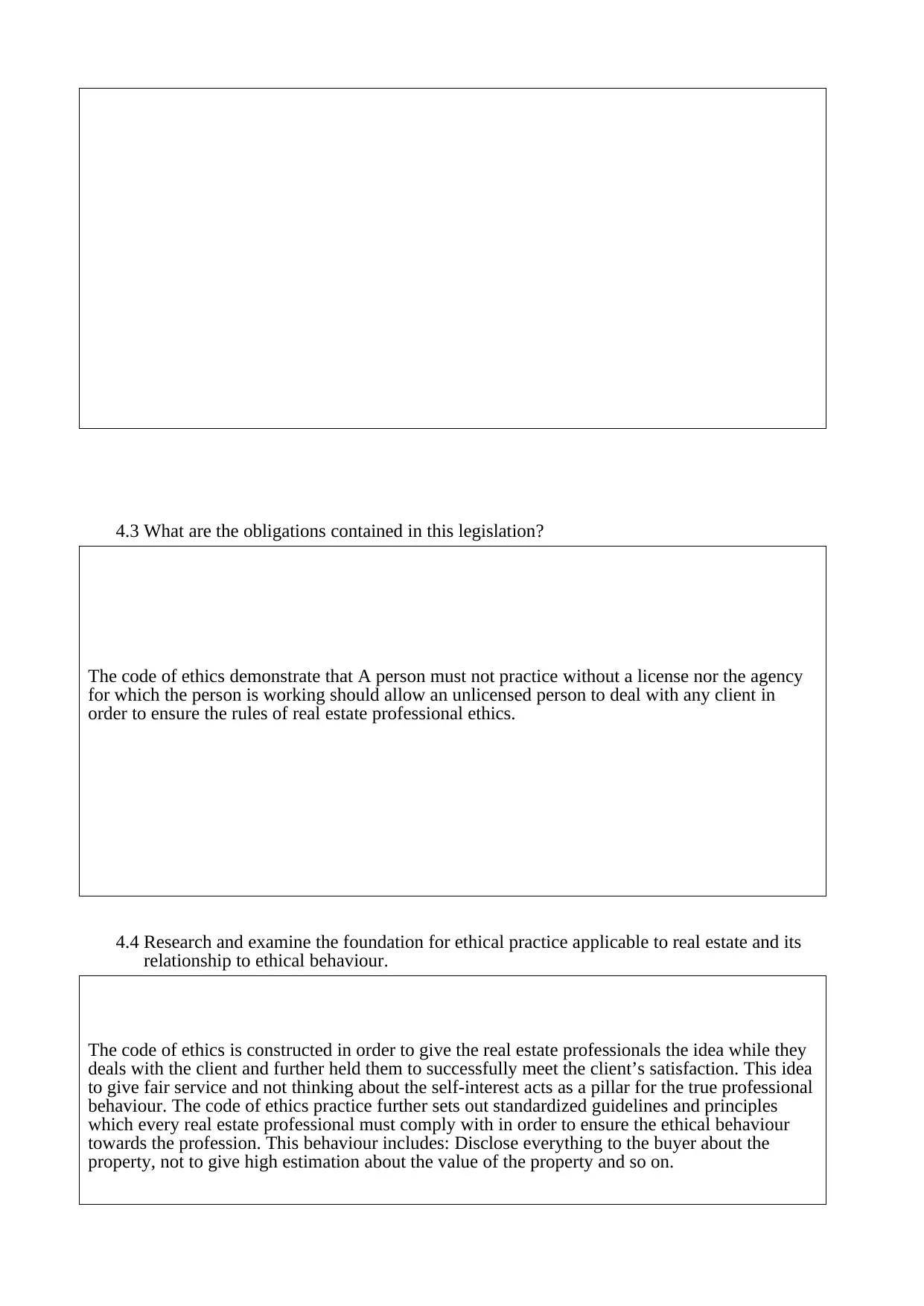
4.3 What are the obligations contained in this legislation?
The code of ethics demonstrate that A person must not practice without a license nor the agency
for which the person is working should allow an unlicensed person to deal with any client in
order to ensure the rules of real estate professional ethics.
4.4 Research and examine the foundation for ethical practice applicable to real estate and its
relationship to ethical behaviour.
The code of ethics is constructed in order to give the real estate professionals the idea while they
deals with the client and further held them to successfully meet the client’s satisfaction. This idea
to give fair service and not thinking about the self-interest acts as a pillar for the true professional
behaviour. The code of ethics practice further sets out standardized guidelines and principles
which every real estate professional must comply with in order to ensure the ethical behaviour
towards the profession. This behaviour includes: Disclose everything to the buyer about the
property, not to give high estimation about the value of the property and so on.
The code of ethics demonstrate that A person must not practice without a license nor the agency
for which the person is working should allow an unlicensed person to deal with any client in
order to ensure the rules of real estate professional ethics.
4.4 Research and examine the foundation for ethical practice applicable to real estate and its
relationship to ethical behaviour.
The code of ethics is constructed in order to give the real estate professionals the idea while they
deals with the client and further held them to successfully meet the client’s satisfaction. This idea
to give fair service and not thinking about the self-interest acts as a pillar for the true professional
behaviour. The code of ethics practice further sets out standardized guidelines and principles
which every real estate professional must comply with in order to ensure the ethical behaviour
towards the profession. This behaviour includes: Disclose everything to the buyer about the
property, not to give high estimation about the value of the property and so on.
⊘ This is a preview!⊘
Do you want full access?
Subscribe today to unlock all pages.

Trusted by 1+ million students worldwide
1 out of 17
Related Documents
Your All-in-One AI-Powered Toolkit for Academic Success.
+13062052269
info@desklib.com
Available 24*7 on WhatsApp / Email
![[object Object]](/_next/static/media/star-bottom.7253800d.svg)
Unlock your academic potential
Copyright © 2020–2026 A2Z Services. All Rights Reserved. Developed and managed by ZUCOL.




